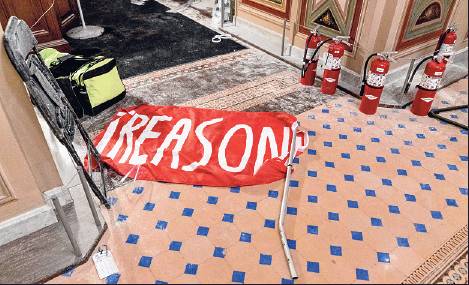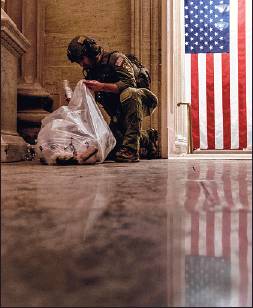CAMPUS
Teachable moment unfolds
Academics reflect on actions, intentions of pro-Trump Capitol mob
By Eduardo Medina and Rachel Silberstein
Albany
In the aftermath of Wednesday’s violence at the U.S. Capitol that forced members of Congress into hiding and left five people dead, many terms have been thrown around to describe the chaos. Was it a coup? An insurrection? An act of terrorism or treason — or something else entirely?
As historians, political scientists and national security experts begin their examination of how President Donald Trump supporters’ destructive actions will be classified, there are still many unanswered questions about the mob that barged through security lines and disrupted the joint congressional session to certify the results of the Electoral College and President-elect Joe Biden’s victory. But Robert Griffin, dean of the University at Albany’s College of Emergency Preparedness, Homeland Security and Cybersecurity, said it was clearly the work of an organized campaign to shut down the usually ceremonial conclusion of the 2020 election.
It’s a threat that will continue to simmer, he said, until those involved are held accountable.
“I’m having a running argument about the correct definition with some people saying it wasn’t technically ‘a coup.’ I do think it was planned,” said Griffin, who previously was a senior official at the U.S. Department of Homeland Security under presidents George W. Bush and Barack Obama.
“They found Molotov cocktails, they found explosive devices, they found long guns — this wasn’t a spur-of-the-moment, let’s-go-exercise-our-First-Amendment-rights (event),” he said. “There were cells within that group that went there purposefully to overturn the government of the United States.”
Rioters were heard yelling that a new American revolution was ensuing, invoking “1776” as a warped rallying cry for independence and freedom, even though their actions — interrupting a peaceful and democratic transfer of power — was antithetical to what the founders fought for.
Jennifer H. Dorsey, a history professor at Siena College who teaches courses focused on Colonial and Revolutionary War-era America, said the usage of “1776” as a chant is rooted in a general distrust of power.
“When you invoke ‘1776,’ what you’re saying is that the government that is in power does not legitimately represent your interest and is thus worthy of being overturned, which is the language of the Declaration of Independence,” Dorsey said, adding it’s “extremely concerning” to think a subset of Americans feel this way without any evidence to support their conspiratorial beliefs.
Wednesday’s events, Dorsey said, bring to mind the Whiskey Rebellion of 1791-1794, when Americans rebelled against a new tax in a manner similar to their rebellion against British taxation, taking over courthouses and other government buildings through force and arms.
“George Washington insisted that this was a new government, and while people had the right to complain about taxation, those tactics were no longer acceptable because there would be an election in two years or four years or six years,” Dorsey said. “The founding fathers felt strongly that once a democratic republic was established in the United States of America, people needed to reserve their grievances for the ballot box.”
Washington deployed a militia to western Pennsylvania in 1794, a show of force that Dorsey said was “designed to make clear those kinds of acts against the government are unacceptable.”
“But that didn’t happen on Wednesday,’ Dorsey said. “I would certainly argue that what happened on Wednesday was worse than what happened in 1794” because there was no response from the federal government.
Instead, what occurred on Wednesday was a brief takeover of one of the nation’s most symbolic government buildings that many say was prompted and permitted by the president of the United States.
Jennifer Delton, a Skidmore College history professor who teaches courses in U.S. history since the Civil War, said there was a tragic symmetry between Wednesday’s storming of the Capitol and the terroristic displays of voter suppression during the era of Reconstruction following the Civil War.
Delton recalled how early Wednesday morning brought news of Georgia electing its first Black senator, the Rev. Raphael Warnock, in a runoff election.
But by midmorning, she said, the election of a Black descendant of sharecroppers to the U.S. Senate was overshadowed by the storming of the “People’s House” in Washington, by a mob who believed, without evidence, that November’s presidential election was rigged.
Delton said it reminded her of how Black voters — who could vote and run for office for the first time in U.S. history during Reconstruction — were often intimidated and terrorized by white Southerners who displayed vicious acts of rebellion, resistance and backlash to undermine elections and democracy.
“Former confederates would try to stop Black Americans from voting at all costs,” Delton said.
And this week, she said, there was a mob largely made up of white people at the Capitol, some carrying Confederate flags, “trying to undo the will of voters” and use “mob rule” to unjustly sway power.
Multiple news organizations reported people in the mob using the phrase “Civil War” to express their resentment and anger. Delton said that during the civil rights movement, the phrase “this is going to be another Civil War” was sometimes said by white Southerners.
You’d hear it during protests opposing school desegregation in Little Rock, Delton said, and in the speeches of white government officials in the South.
“When you hear that language of ‘Civil War,’ it is enmeshed with the ongoing racial politics of the United States,” Delton said.
Now, as Trump’s presidency approaches its end, questions of racial justice linger. Those questions will be ever-present as the nation begins to reflect on the historical significance of Trump’s four years in the White House.

